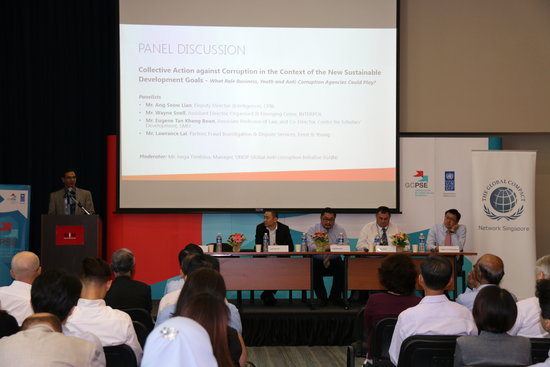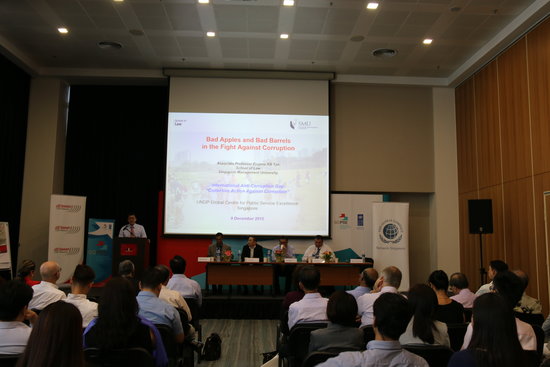The fight against corruption and fraud: clean business is everyone’s business
9 December is the day that the UN has designated as International Anti-Corruption Day and to commemorate the occasion, the UNDP Global Anti-Corruption Initiative (GAIN) organised a panel discussion at the UNDP Global Centre for Public Service Excellence in Singapore. The theme was “Collective action against corruption in the context of the new Sustainable Development Goals: what role business, youth and anti-corruption agencies could play?”
Mr. Thomas Thomas, CEO of ASEAN CSR Network (ACN) gave the opening remarks. He noted that corruption is a huge problem and is a serious challenge for growth, and hurting the most vulnerable groups such as the poor, women and minorities disproportionately.
In the region, it’s important to instill a culture of integrity and anti-corruption. As ASEAN tries to capitalize on the opportunities presented by regional integration post-2015, it is now imperative for all stakeholders to meet numerous challenges head on, with curbing corruption a top priority for all. Businesses, youth and anti-corruption agencies are expected to play an enhanced role and by joining hands together, we can “break the corruption chain,” and create a culture of integrity in ASEAN.
He also mentioned the Regional Working Group on Business Integrity which was established in 2014 and that the Working Group members and partners are working together to develop and promote a regional framework and action plan for business integrity in ASEAN.
Ms. Aida Arutyunova, Anti-Corruption Specialist, UNDP GAIN, gave a presentation of the 2015 UN International Anti-Corruption Day Campaign. She also talked about the video contest open to all those below 35 years old in Southeast Asia. The contest requires participants to make a short video clip showing the negative impacts of corruption. Three of the best videos will be selected and the award ceremony will be held at the “Governance & Social Responsibility” Forum to be held in Singapore in July 2016.

Moderator Mr. Anga Timilsina, UNDP GAIN speaking. Panellists seated from left:
Mr. Lawrence Lai, EY Singapore; Mr. Ang Seow Lian, CPIB; Mr. Wayne Snell, INTERPOL;
and Associate Professor Eugene Tan, SMU
Panellists for the day included Mr. Ang Seow Lian, Deputy Director (Intelligence) from the Corrupt Practices Investigation Bureau in Singapore gave an overview the Singapore experience in preventing corruption. He talked about collaboration on outreach programmes with partners such as government agencies and the private sector.
Assistant Director, Organised and Emerging Crime, Interpol, mentioned about the challenges to traditional methods in tackling corruption and why the linkages to the private sector is important.
Associate Professor Eugene Tan, School of Law, Singapore Management University, noted that too much focus is on the “bad apples” in fighting against corruption but the loss of trust in corrupt practices were not given enough attention. He said it’s important to consider the role of ethics, values and personal accountability in reforming culture and behavior.
Associate Professor Eugene Tan, SMU, giving his presentation
Assoc. Prof Tan also talked about the challenges businesses faced in doing business overseas especially in countries where corrupt practices are more endemic. He said we needed a culture that holds individuals accountable for good or bad behavior and that this cultural paradigm must come from within an organisation, ranging from top management to the rank and file.
The fight against corruption need to go beyond using laws and stepped-up enforcement and leadership is vital in improving integrity in the company. He concluded with this acronym – TINA – There Is No Alternative in dealing with corruption.
Mr. Lawrence Lai, Partner, Fraud Investigation & Dispute Services in EY Singapore was also one of the panellists. He mentioned a very interesting survey that EY did – the EY Asia Pacific Fraud Survey 2015 – Fraud and corruption – driving away talent? In that survey, it was found that two-thirds of respondents think having a good reputation for ethical behavior is a commercial advantage, demonstrating that this advantage includes talent retention, providing a new and powerful imperative for more robust compliance.
Mr. Lai also shared what companies must do to retain talent in light of the survey findings. Companies must prioritise and have
- strong ethical leadership;
- strong and effective ethics policies, guidelines and training;
- third party due diligence;
- the use of forensic data analytics and big data; and
- whistleblower hotlines
He ended off by saying “Clean business keeps you in business and clean business is everyone’s business.”
